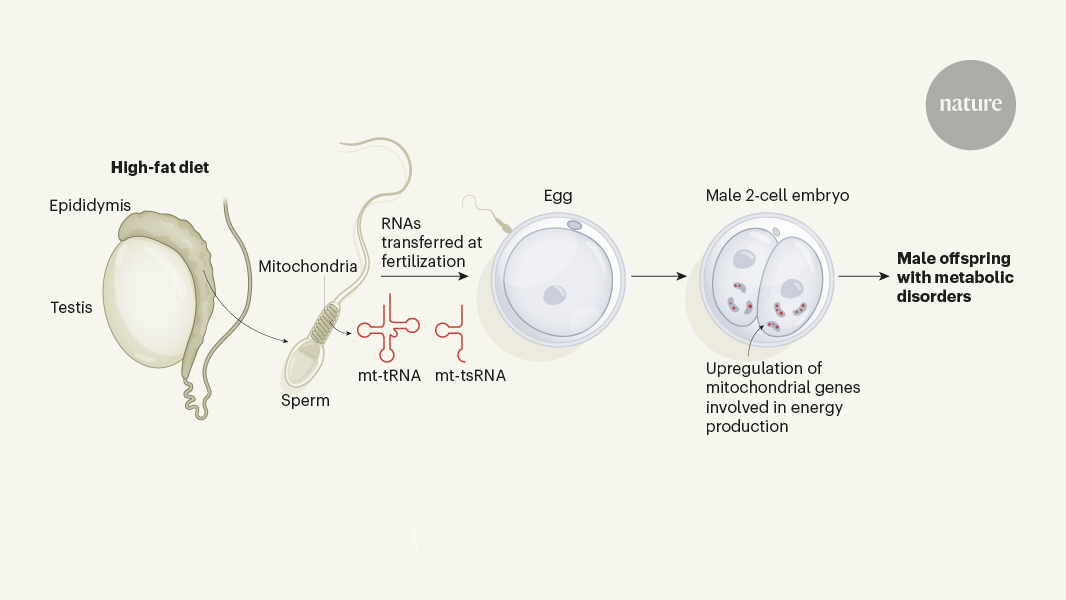Paternal Diet Shapes Offspring Metabolism Through Sperm RNA Transmission
Основні поняття
Paternal diet and mitochondrial quality can influence offspring metabolism through the transmission of specific mitochondrial RNAs in sperm, which act as sensors of environmental conditions.
Анотація
The article discusses how paternal diet and mitochondrial quality can influence the metabolic health of offspring through the transmission of specific mitochondrial RNAs in sperm. While mitochondrial DNA (mtDNA) is inherited exclusively from the mother, various types of RNA carried by sperm can respond to environmental conditions and affect the traits of offspring, including the development of metabolic disorders.
The key findings are:
- In both mice and humans, specific mitochondrial RNAs in sperm act as sensors of paternal diet and mitochondrial quality.
- This potentially regulates offspring metabolism by affecting embryonic development.
- The study demonstrates how paternal environmental factors can be transmitted to the next generation through sperm RNA, rather than just through genetic inheritance.
- This provides insights into the mechanisms of intergenerational metabolic effects and has implications for understanding the role of paternal factors in offspring health.
Customize Summary
Rewrite with AI
Generate Citations
Translate Source
To Another Language
Generate MindMap
from source content
Visit Source
www.nature.com
Father’s diet influences son’s metabolic health through sperm RNA
Статистика
DNA found in organelles called mitochondria (mtDNA) is inherited exclusively from the mother, owing to mechanisms that include the elimination of mtDNA from sperm before fertilization.
Various types of RNA carried by sperm can respond to environmental conditions and influence the traits (phenotypes) of offspring, including whether or not they develop metabolic disorders.
Цитати
"various types of RNA carried by sperm can respond to environmental conditions and influence the traits (phenotypes) of offspring, including whether or not they develop metabolic disorders"
"specific mitochondrial RNAs in sperm act as sensors of paternal diet and mitochondrial quality"
Ключові висновки, отримані з
by Chen Cai о www.nature.com 06-05-2024
https://www.nature.com/articles/d41586-024-01502-w
Глибші Запити
How might the findings of this study be applied to improve preconception counseling and interventions to promote healthier offspring?
The findings of this study suggest that paternal diet can influence offspring metabolic health through sperm RNA. This information can be utilized in preconception counseling to educate prospective parents about the importance of a healthy diet not only for their own well-being but also for the future health of their children. Healthcare providers can offer personalized dietary recommendations based on the impact of specific mitochondrial RNAs in sperm on offspring metabolism. Interventions could include nutritional guidance, supplementation, and lifestyle modifications to optimize sperm RNA profiles and promote healthier offspring.
What other types of environmental factors, beyond diet, might influence the mitochondrial RNA profiles in sperm and subsequently impact offspring health?
Apart from diet, various environmental factors can influence mitochondrial RNA profiles in sperm and impact offspring health. Factors such as exposure to toxins, pollutants, radiation, stress, and lifestyle habits like smoking and alcohol consumption can alter sperm RNA composition. Additionally, temperature fluctuations, infections, and even psychological factors may also play a role in modifying mitochondrial RNA profiles in sperm. Understanding the broader range of environmental influences on sperm RNA can provide insights into how to mitigate negative effects and promote better offspring health.
What are the potential evolutionary implications of this intergenerational transmission of metabolic information through sperm RNA, and how might it shape the adaptation of species to changing environments?
The intergenerational transmission of metabolic information through sperm RNA has significant evolutionary implications. It suggests a mechanism by which species can adapt to changing environments more rapidly than through genetic mutations alone. By transmitting information about environmental conditions and metabolic health across generations, species can potentially enhance their survival and reproductive success in dynamic environments. This process may contribute to the diversification and specialization of species, allowing them to thrive in specific ecological niches. Furthermore, the ability to pass on acquired metabolic traits through sperm RNA could offer a form of non-genetic inheritance that complements genetic variation in driving evolutionary processes.
0
